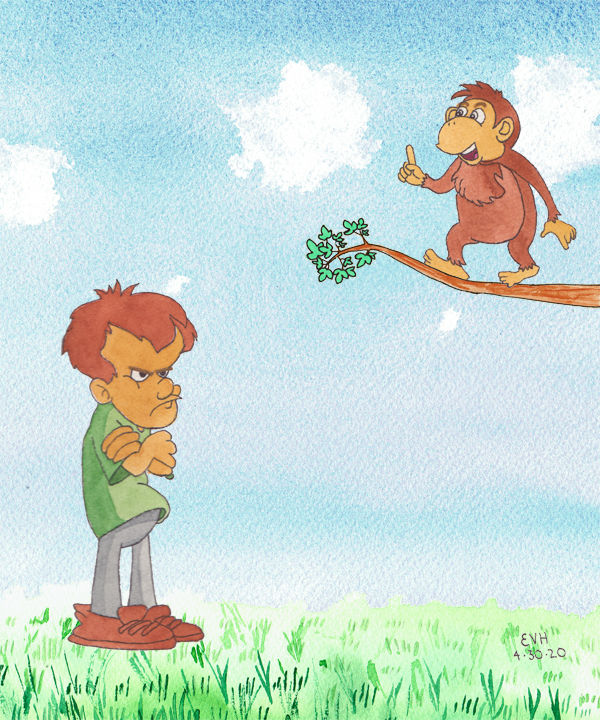
Jataka 365
Ahiguṇḍika Jātaka
The Snake Charmer
as told by Eric Van Horn
originally translated by H.T. Francis and R.A. Neil, Cambridge University
originally edited by Professor Edward Byles Cowell, Cambridge University
As the story in the present states, this is essentially the same story as Jātaka 249 in which a cruel monk—yes! They exist!—tries to manipulate a novice monk. But the novice—and the monkey in the Jātaka itself—are wiser than that.
Yay! A story with a good monkey! Always a bonus.
“Lo! here we lie.” The Master told this story while he was living at Jetavana. It is about an aged monk. The story has been already related in full in the Sālaka Birth (Jātaka 249). In this version—also—the old man abuses and strikes a village boy after ordaining him. The lad escaped and returned to the world. The old man once more ordained him, and then he acted just as before. The youth returned to the world once again. And on being solicited to come back once more, he would not so much as look the old man in the face.
The matter was discussed in the Dharma Hall, how that elder could neither live with his novice or without him. The sensitive boy—after seeing the old man’s temper—would not even look at him. The Master came and asked what they were discussing. When they told him, he said, “Not only now, monks, but formerly also, this same youth was a sensitive novice. And after seeing the elder’s faults, he would not so much as look at him.” And so saying he told them this story from the past.
Once upon a time, when Brahmadatta was reigning as the King of Benares, the Bodhisatta was born into a corn farmer’s family. And when he grew up, he earned his living by selling the corn.
Now a certain snake charmer caught a monkey and trained him to play with a snake. And when a festival was proclaimed at Benares, he left the monkey with the corn merchant and roamed about for seven days entertaining people with the snake. The merchant, meanwhile, fed the monkey with food both hard and soft. On the seventh day the snake charmer got drunk at the festival. When he returned. he struck the monkey three times with a piece of bamboo. Then he took him to a garden, tied him up, and fell asleep.
However, the monkey got loose from his chain. He climbed up a mango tree and sat there eating the fruit. When he woke up, the snake charmer saw the monkey perched on the tree and thought, “I must catch him by coaxing him.” And he repeated the first stanza:
Lo! here we lie, my pretty one,
Like gambler by the dice undone.
Let fall some mangoes, well we know,
Our living to your tricks we owe.
The monkey, on hearing this, uttered the remaining verses:
Your praises, friend, unmeaning sound,
A pretty monkey ne’er was found.
Who in the stores, when drunk, I pray,
Did starve and beat me sore today?
When I, snake charmer, call to mind
The bed of pain where I reclined,
Though I should someday be a king,
No prayer from me this boon should wring,
Your cruelty remembering.
But if a man is known to live
Content at home, is apt to give,
And springs of gentle race, the wise
With such should form the closest ties.
With these words the monkey disappeared into a thicket of trees.

Figure: The wise monkey is not fooled
The Master here ended his lesson and identified the birth: “At that time the old man was the snake-charmer, the novice was the monkey, and I was the corn merchant.”
